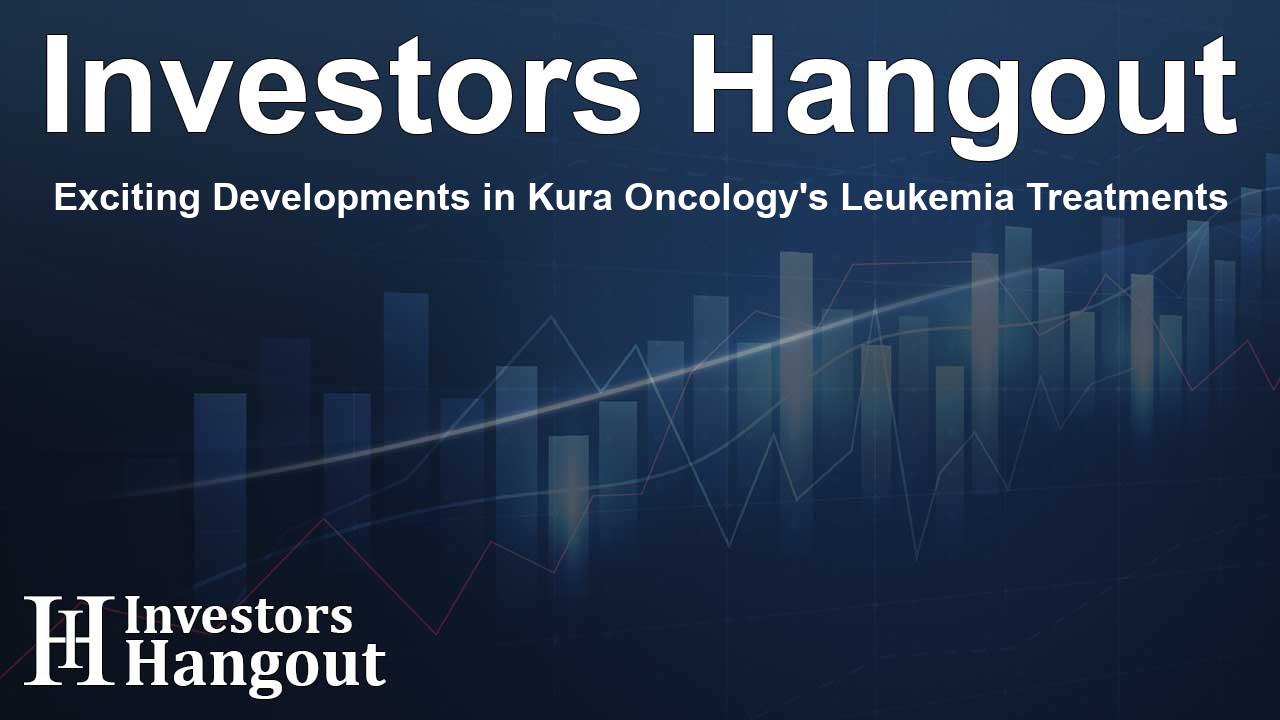Exciting Developments in Kura Oncology's Leukemia Treatments

Kura Oncology Secures Major Funding for Leukemia Research
Kura Oncology, Inc. (NASDAQ: KURA) has recently taken significant steps forward in its research efforts aimed at fighting leukemia. Sharing the exciting news of acquiring a $30 million milestone payment, the biotech company is enhancing its abilities to develop targeted therapies. This payment comes on the heels of the successful first patient dosing in the KOMET-017 Phase 3 study involving the drug ziftomenib, a breakthrough oral menin inhibitor.
Advancements in Ziftomenib Trials
The KOMET-017 initiative is pioneering as it encompasses two independent randomized Phase 3 trials evaluating ziftomenib's effectiveness combined with varying chemotherapy regimens. These trials particularly focus on patients who have newly diagnosed NPM1 mutations or KMT2A rearrangements.
Distinctly, Kura's program stands out as it represents the only menin inhibitor making advancements through concurrent registrational studies in both intensive and non-intensive treatment settings. This innovative approach demonstrates Kura's commitment to precision medicine aimed at addressing the unique needs of acute myeloid leukemia (AML) patients.
Insights from Recent Data Presentations
The company has unveiled fresh preliminary data from its farnesyl transferase inhibitor (FTI) programs, specifically darlifarnib (KO-2806) and tipifarnib. Presented at a prominent medical conference, these findings showcase the company's dedication to exploring new treatment avenues. Kura’s president and CEO, Troy Wilson, Ph.D., J.D., emphasized the importance of combining FTIs with other targeted therapies to combat resistance and improve patient outcomes.
The Role of Farnesyl Transferase Inhibitors
Wilson noted, "Kura Oncology is pioneering the use of FTIs alongside tyrosine kinase inhibitors (TKIs), PI3K? inhibitors, and KRAS inhibitors. This strategic combination targets both innate and adaptive resistance mechanisms, enhancing the overall effectiveness of these therapies." The findings suggest that darlifarnib is not only manageable in terms of safety but also demonstrates promising antitumor activity.
Broader Impacts on Oncology Pipeline
Kura is relentlessly advancing its oncology pipeline, focusing on developing both darlifarnib and tipifarnib across various combination settings. The strategic objective of these combinations is to enhance treatment responses for patients facing resistance to existing therapies.
The firm’s ongoing research strategy highlights the importance of FTIs as essential tools in uncovering novel pathways for tumor suppression. Kura's efforts reaffirm its position in the oncological landscape, showcasing its innovative methodologies aimed at extending treatment durability.
Current Market Response
As a reflection of the company’s achievements, KURA shares have seen a noticeable increase, soaring by 3.57% to reach $9.425, showcasing investor confidence in the firm's advancing strategies and research capabilities.
The Future of Kura Oncology
With the successful trial of ziftomenib and the promising data from its FTI programs, Kura Oncology is setting a course for a transformative impact on oncology therapeutics. This trajectory opens up exciting opportunities for enhancing treatment efficacy and patient care, indicating a bright future for both the company and the patients it aims to serve.
Frequently Asked Questions
What is the significance of the $30 million milestone for Kura Oncology?
This milestone represents a major financial boost that will enable Kura Oncology to further its research and development efforts for leukemia treatments.
What does the KOMET-017 Phase 3 study involve?
The KOMET-017 study is evaluating the efficacy of the drug ziftomenib used in combination with intensive and non-intensive chemotherapy treatments for specific leukemia patients.
Who are the key individuals at Kura Oncology?
Dr. Troy Wilson serves as the president and CEO, leading the company’s innovative strategies in oncology.
How does the FTI program contribute to cancer treatment?
The FTI program aims to combine farnesyl transferase inhibitors with other drugs to enhance responses and overcome resistance in cancer therapies.
What has been the market's reaction to Kura Oncology's recent developments?
KURA shares have increased in value, reflecting positive investor sentiment regarding the company's advancements and potential impact in the oncology field.
About The Author
Contact Logan Wright privately here. Or send an email with ATTN: Logan Wright as the subject to contact@investorshangout.com.
About Investors Hangout
Investors Hangout is a leading online stock forum for financial discussion and learning, offering a wide range of free tools and resources. It draws in traders of all levels, who exchange market knowledge, investigate trading tactics, and keep an eye on industry developments in real time. Featuring financial articles, stock message boards, quotes, charts, company profiles, and live news updates. Through cooperative learning and a wealth of informational resources, it helps users from novices creating their first portfolios to experts honing their techniques. Join Investors Hangout today: https://investorshangout.com/
The content of this article is based on factual, publicly available information and does not represent legal, financial, or investment advice. Investors Hangout does not offer financial advice, and the author is not a licensed financial advisor. Consult a qualified advisor before making any financial or investment decisions based on this article. This article should not be considered advice to purchase, sell, or hold any securities or other investments. If any of the material provided here is inaccurate, please contact us for corrections.
